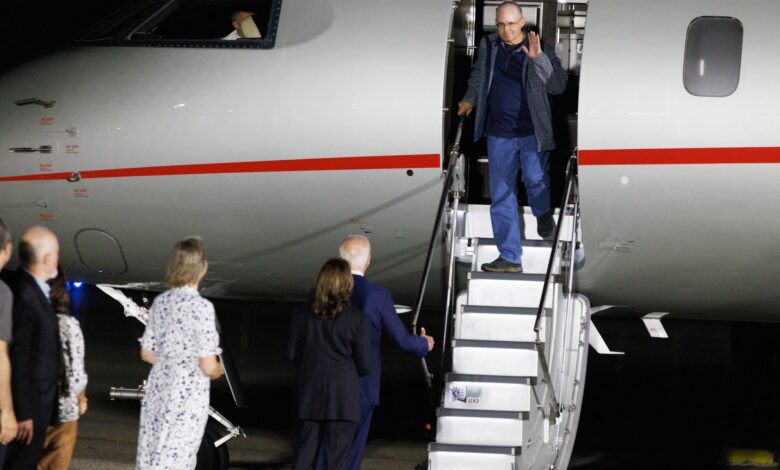
The August 1 prisoner swap between the US, Germany, and Russia has brought Joe Biden’s foreign policy team some short-term acclamation for getting back three innocent Americans held for years in Russian prisons, along with four innocent Germans and the heroic Russian dissident and reformer Victor Kara-Murza — the right-hand man to murdered Russian leader Alexy Navalny.
But despite appearances, this development is not progress: it augurs more sovereign “piracy” by the enemies of free nations.
Of course, we should all be overjoyed that Wall Street Journal reporter Evan Gershkovich, Marine Paul Whelan, and the independent radio journalist Alsu Kurmasheva have returned to the US, and that Kara-Murza and two other Russian dissidents were saved.
But the price for their release was huge: an FSB colonel who assassinated a Chechen national in Germany, another FSB agent who laundered money for the Kremlin, an operative who hacked into computers to make trades netting millions for Vladimir Putin’s coffers, another Russian agent who moved American ammunition into Russia, and four confirmed Russian spies held in western prisons.
Asymmetric Swaps
These are in no way symmetric swaps: Russians convicted of very serious crimes in impartial jury trials are increasingly being traded for completely innocent Western journalists, businesspersons, and athletes who were snatched at Putin’s command and convicted many months after capture in Russian kangaroo courts.
The same was true when American basketball star Brittany Griner was exchanged for Russian arms dealer Vicktor Bout, nicknamed “the merchant of death.”
These moves are nothing like the US-Soviet swaps during the 20th century Cold War, when actual American operatives and military agents were captured in Russia. We are trading innocents for hardened criminals involved in enabling totalitarian systems of mass murder.
The same holds for Biden’s September 2023 decision to release over $6 billion in Iranian assets, which were held sequestered in a South Korean account, in exchange for five innocent Americans held for years without just cause by Iran’s totalitarian theocracy.
Rather than “prisoner exchanges,” we should be calling them “criminals for hostages swaps.”

Hostage Diplomacy
The glaring problem with such “hostage diplomacy” is obvious: as Senator Mitt Romney said of the Iran deal, the appearance of paying more than $1 billion for each American freed will only encourage more hostage-taking.
Putin will be further emboldened to order more Russian agents and proxies to carry out assassinations, hacking, fraud, weapons trafficking, and attacks on democratic election systems because he can retrieve any of his agents who are caught and convicted: all he has to do is snatch some innocent Americans, Germans, or other Western citizens to use as bargaining chips.
This is a losing spiral: sovereign hostage-taking has been increasing for years, just like ransomware, and it is a bipartisan problem no matter who is in the White House. In 1985, Ronald Reagan infamously sent arms to Iran in exchange for US hostages held in Lebanon as part of an illegal complex larger deal. Short-term gain leads to long-term pain.
The situation is similar when terrorist groups take hostages. In his 2018 book on terrorism, economist and game theory expert Todd Sandler notes one study that found that 2.62 “additional abductions” resulted from concessions to get one hostage back.
The International Center for Counter-Terrorism concludes that rewarding terrorist kidnappers can “encourage imitation and become contagious.”
This is why, ironically, the Biden administration earlier this year began seriously considering a ban on paying ransomware attackers to release computing systems they have seized. But the White House and congressional leaders failed to follow through on this, caving to pressure from corporations and local governments that fear having no recourse when their systems are breached.
New International Hostage Game
Of course, hostage-taking has been part of warfare and hostile relations among nations for many centuries.
Yet medieval kings and queens responded very differently than Western authorities do now: when their innocent citizens were captured and held, they would often snatch innocents from the other side to use as bargaining chips.
Western nations have not done this because our systems of justice are not dictatorial and include habeas corpus, which is the basic right to a speedy and impartial trial. Thus, as Keir Giles from Chatham House told Newsweek, Putin can retrieve his “murderers, spies, and criminals” by taking Western hostages to trade for them, knowing that the US cannot “respond in kind.”
This central asymmetry is now the reason why the US and its allies are losing so badly in the new international hostage game.
To even the scales, American presidents may have to consider detaining Russians or Iranians of interest to their regimes whenever those dictators grab innocent Americans. This would require suspending habeas corpus for those foreign nationals we hold under special reprisal orders, and exchanging only them – not Russians, Iranians, or Chinese operatives already convicted of major crimes – in exchange for American victims.
In other words, we would need to copy Putin’s tactic of “stockpiling” prominent Americans to use as bargaining chips.
For example, when Putin seized and held Griner to use as a pawn in exchange for Russian criminals justly convicted in the US, we could have responded by seizing three more Russians closely connected with the Kremlin and suspected of shady dealings. Indefinite detentions of select foreign nationals held for months or years without trial might sound extreme; yet without such reprisals, we will see more innocent victims in Griner’s and Gershkovich’s former situation.

Legal Reforms
We could further strengthen this tit-for-tat response with legal reforms that also beat ransomware.
Outlawing all forms of payment for taking innocent American hostages and seizing control of computer systems is the most essential step. The law should include “waivers” or presidential permissions to pay only when hundreds of lives or hundreds of billions in assets are at stake, and should include criminal penalties for its violation, given the desperation payers endure.
When such a law is strictly enforced, sovereign adversaries seizing computers or human hostages will eventually realize that they are wasting their time and resources on such efforts.
So we should reconsider the policy announced by President Barack Obama in June 2015, which he broke and both Donald Trump and Biden rejected, that “the United States government will make no concessions to individuals or groups holding US nationals hostage.”
While this policy should not apply to exchanging prisoners of war, it can deter civilian hostage-taking because returning foreign civilians seized in reprisal is not a “concession.”
Beyond banning paying ransoms in all forms, we need to punish rogue regimes that snatch our citizens as political prisoners with other reprisals — such as destruction of military assets and even detention of their own friends working in the US.
The ultimate solution is to rid the Earth altogether of dictators who take innocents as political hostages, but that will probably require a global alliance of democratic nations of the sort outlined in my book, A League of Democracies.
 John Davenport is Professor of Philosophy and Peace & Justice Studies at Fordham University.
John Davenport is Professor of Philosophy and Peace & Justice Studies at Fordham University.
He is the author of The Democracy Amendments, available through Amazon.com.
The views and opinions expressed here are those of the author and do not necessarily reflect the editorial position of The Defense Post.
The Defense Post aims to publish a wide range of high-quality opinion and analysis from a diverse array of people – do you want to send us yours? Click here to submit an op-ed.











